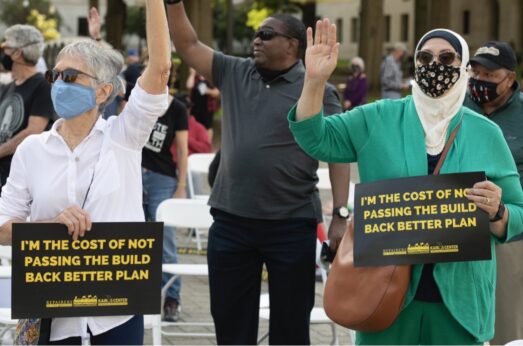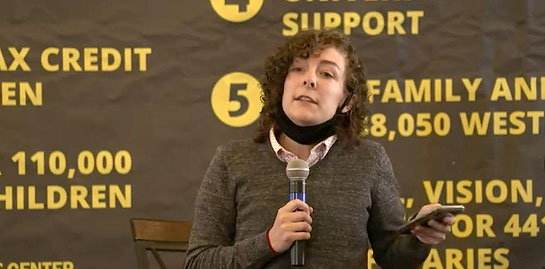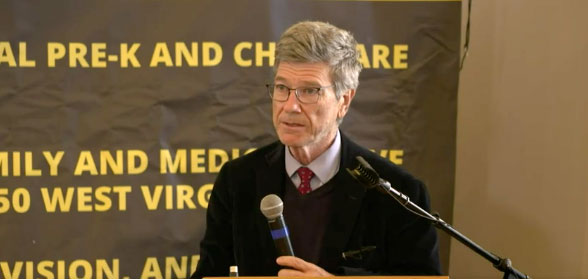
CHARLESTON, W. Va.—The Poor People’s Campaign is taking its drive to lift poor and low-wealth people up off the economic floor right to the top: President Joe Biden.
In a letter read at the end of the campaign’s 2-hour-15-minute Monday town hall in a church in Charleston, W. Va., speakers took turns telling the Democratic chief executive why they want to meet him face-to-face on Nov. 15, and before Congress clears Biden’s Build Back Better social program expansion, if it does.
That legislation is designed to fill in gaping holes in the safety net, although many of the provisions that have been dropped in the bargaining between Biden, congressional Democratic leaders, and so-called “moderates” such as Sen. Joe Manchin, D-W. Va., would—if enacted a generation or more ago—have forestalled the economic inequality and rampant poverty we face now.
Just to give one example, Poor People’s Campaign co-chair Pam Garrison told the group and Zoom viewers that she’s been fighting to raise the minimum wage “for 40 years.” Raising it is one demand in the PPC letter to Biden. The federal minimum wage, $7.25 hourly, has been stuck since 2009, and Congress didn’t raise it this year either.
The reasons: The unanimous 50-person Senate GOP against it, a theatrical “no” vote from the other key Senate Democratic “moderate,” Arizonan Kyrsten Sinema, and vicious opposition from corporate lobbies, led by the National Retail Federation and the National Restaurant Association, whose members are the most-infamous for exploiting workers.
Being poor in the richest nation on Earth
All that led the West Virginians to want to tell Biden about what it’s really like to be poor in the richest nation on Earth and tell him what real people need from his Build Back Better plan. They’re coming to D.C. for another demonstration on Capitol Hill that day and want to meet Biden then.

The meeting with Biden is needed, said the Rev. William Barber II, the PPC co-chair, to counteract the influence of D.C. insiders, including lawmakers such as Manchin and Sinema and the lobbyists they listen to.
“There’s a lot of lying that’s been going on” about the state of poor and low-wealth people around the U.S., Barber added, after rattling off statistics about poverty in the Mountaineer State and nationwide.
“Three hundred and fifty-two thousand people” in West Virginia “don’t make $15 an hour, the basic living wage” the NPPC—and unions—are campaigning for.
Census data shows West Virginia’s median income of $26,480 is second to last, ahead of only Mississippi ($24,369). Both figures, spread over a typical working year, fall far below $15 an hour ($31,200 for 52 40-hour weeks). The median is where half the people are above and half below.
Biden’s ducked prior requests to meet poor and low-wealth people, who, Barber noted, were one-third of last November’s electorate. Studies show they gave the Biden-Harris ticket a substantial majority, especially in key swing states. Biden staffers have met with Poor People’s Campaign members, and talked of a meeting with the president—after the BBB is enacted. That won’t do, Barber said.
Manchin’s sole meeting with the Poor People’s Campaigners, months ago, saw him listen to individual stories while not accepting the reality of systemic poverty, nationally or in his state.
“Our backs are to the wall,” the PPC’s letter to Biden says. “We need infrastructure,” it adds, referring to the “hard” infrastructure bill lawmakers just approved, worth $1.2 trillion over a decade.
That measure, which Biden plans to sign this week, devotes funds to replacing or rebuilding the nation’s crumbling roads, creaky subways, collapsing bridges, aging airports, and lead-lined water pipes. It also would wire the whole nation for the high-speed internet. At the Charleston session, speakers praised that bill but said it’s not enough.
“We also need infrastructure for our daily lives,” meaning the BBB Act, the letter says. And it demands restoring full voting rights and raising the federal minimum wage to $15.
“This is not about a battle between your agenda and Sen. Manchin’s agenda or center-left versus center-right or Democrat versus Republican. This is about low-wage people…. We are fighting for our lives. Will you meet with us?” the letter asks.
Daycare would make the difference
Speakers at the town hall reinforced the letter’s point via personal stories of battling poverty, linking them to both how the BBB plan could help, and how Manchin has refused to listen. “We get upset because we know the pain,” said Barber.

Charleston native single mother Hunter Sparks, who had to leave early to pick up her 4-year-daughter from daycare, told the group she had to resign her well-paying state job, where she got 12 weeks of paid leave to have the baby, when her elderly mother became ill, too. She asked for unpaid leave. Bosses denied it. She had to choose and left her job. That was four years ago, pre-pandemic.
No one should have to choose between keeping her job or taking care of her daughter, or her mother, Barber replied.
Daycare for her daughter isn’t cheap, Sparks said. “It’s $195 a week. That’s 60% of my present income” from two lower-wage jobs with no paid family leave and no health insurance. She has to wait for her annual income tax refund to pay vital bills, such as for doctors or state property taxes on her car.
The BBB bill would cap the share of total income any family must pay for daycare at 7%, with money from Biden’s bill picking up the rest of the tab. And it would guarantee a $15 hourly wage for daycare workers, whose median wage is $11-$12.
Daycare is yet another case where had it been effect two generations ago, mothers would not have the agonizing choice Sparks faced. Actually, it was, during World War II: With fathers off fighting fascism and mothers being Rosie the Riveters, the Roosevelt administration encouraged major war production plants, notably Kaiser shipyards, to set up on-site daycare centers—paid for by federal funds. The GOP calls daycare “a socialist spending spree.”
The rich vs. the rest of us
“Does he represent you?” Barber asked Sparks about Manchin. “No, I don’t think he does,” she said of her senator. “He’s way too comfortable…There’s a lot of things in the BBB that would prevent further problems” for her and other West Virginians “and make things better right now.”
“This is my state, these are my people!” an angry Garrison, one of three NPPC West Virginia co-chairs, and a graying grandmother exclaimed. “For 40 years, I’ve been fighting for a minimum wage increase and I’ve been hearing the same thing,” meaning excuses about why companies can’t afford it.
Garrison also took a large potshot at the corporate interests which back Manchin and the other Democratic holdout, Sinema, in the 50-50 Senate. Other speakers noted the West Virginian owns a houseboat (which he lives on in D.C.), and a fancy Italian car—and made $8 million last year from investments, primarily in coal companies.
“They voted to take away my health care!” Garrison said, referring to Manchin’s demands to omit Medicare coverage for vision, hearing, and dental work, in order to reduce the measure’s price tag. “They voted to tear down my kids’ and my grandkids’ futures! I’m not taking it anymore!”
After negotiations behind closed doors with key Democratic lawmakers, including Manchin, Sinema, and House Speaker Nancy Pelosi, D-Calif., the BBB measure, officially a “reconciliation bill” designed to avoid a Senate GOP filibuster, would allot $175 billion yearly over 10 years for a large expansion of the social safety net.

That’s less than one-half of 1% of gross domestic product, economist Jeffrey Sachs told the crowd in the church and thousands of others who joined in via Facebook and Zoom.
“The rich have gotten very rich. Take some of this money and let this wonderful mother have some child care or money to take care of her elderly mother,” he said, turning to Sparks. The whole session can be viewed on Twitter and Facebook.
The current total is also only half of what the BBB’s original crafter, Sen. Bernie Sanders, Ind-Vt., proposed and $900 billion less yearly than what the PPC and the Economic Policy Institute say the nation really needs to eradicate rising poverty. The share of poor and low-wealth people in the U.S. has reached 43%, and five or six men—headed by Elon Musk and Amazon founder Jeff Bezos—are worth $1 trillion combined all by themselves, Sachs said.
The AFL-CIO is also campaigning for the Build Back Better bill. “There is still more work to be done. The Build Back Better Act will knock down the barriers that prevented so many workers, especially women and people of color, from finding high-quality sustainable jobs. We are so close to making our economy fairer and safer for working people, and we can’t stop now,” fed President Liz Shuler said.
While Biden has become a new target for a face-to-face meeting, he’s not the only one. Besides Manchin, who has met with the group only once and promised to solve individual problems while overlooking the systemic poverty of his state, the Poor People’s Campaign will descend on senators’ offices on Nov. 10.
Democrats they plan to visit include—so far—Manchin, Majority Leader Charles Schumer and Kirsten Gillibrand (both N.Y), Cory Booker (N.J.), Sheldon Whitehouse and Jack Reed (both R.I.), Alex Padilla (Calif.), Bob Casey (Pa.), and Debbie Stabenow and Gary Peters (Mich.).
They’ll also go to the offices of Independent Angus King of Maine and Republicans Susan Collins (Maine), Pat Toomey (Pa.), Deb Fischer (Neb.), Tommy Tuberville (Ala.), Jerry Moran (Kansas), and Rob Portman (Ohio).










